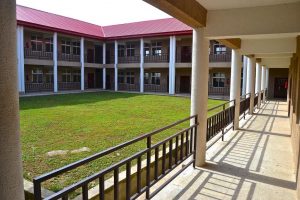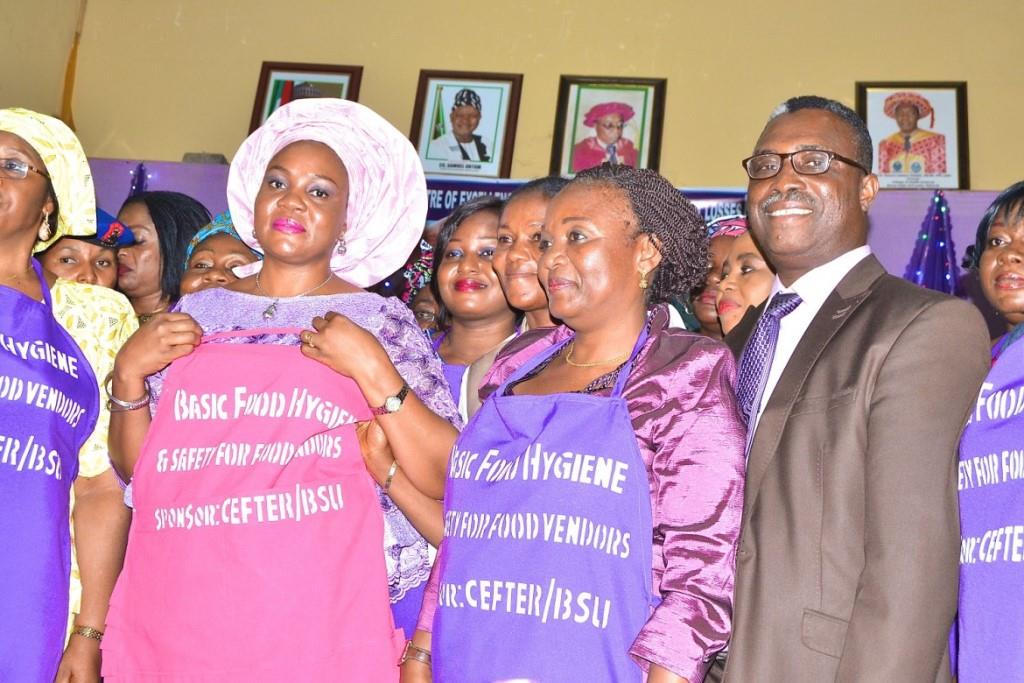The mandate of the Centre of Excellence for Food Technology and Research (CEFTER) at the Benue State University (BSU), Makurdi, is to develop a critical mass of well-trained Africans to control post-harvest losses, using improved learning methods by engaging farmers, communities and industries in the dissemination of technologies that would curb post-harvest food losses, to ensure food security.
CEFTER report estimates that Sub-Saharan Africa loses food valued at about USD 4 billion, annually, due to post-harvest losses. Also, contaminated food, due to poor storage, accounts for about 1.5 billion cases of diarrhoea, leading to three million deaths in Africa, yearly. The Centre is, therefore, committed to promoting research and development on post-harvest technologies, to curb losses and enhance agricultural productivity for the socio-economic advancement of Nigeria and Africa at large. The Centre’s areas of concentration include, identifying technologies aimed at reducing post-harvest food losses, through research; production of high quality manpower, through training, to boost application of improved post-harvest technologies; dissemination of post-harvest technologies to end-users, especially rural farming communities; empowering African researchers to identify technologies that will reduce post-harvest losses and development of technologies through applied research, to reduce post-harvest losses.
The crops being addressed by the Centre include roots and tubers (cassava, yam, sweet potatoes, etc.); cereals (rice, maize, millet, sorghum, etc.); fruits and vegetables (mango, citrus, tomato, etc.). The research and development on these crops would be concentrated on upgrading local fermentation techniques for roots and tubers to improve nutrients and extend shelf-life; nutritional improvement of cassava flour by implantation with soy flour and development of mobile solar kilns for drying agricultural materials, among others. Fruits and vegetables (mango, orange, tomatoes, spinach) research areas include production of jam from various local fruits; production of tomato ketchup using local spices and condiments as well as development of non-power dependent evaporative coolers for storage of fresh fruits and vegetables. Research work on cereals (soybean, maize, sesame, etc.) include use of germination and accelerated natural fermentation for improving the quality of cereals and soybean-based wearing foods; development of pasteurisation schedules for safety; shelf-life extension of Soymilk and ‘Kunun Zaki (local gruel drink); use of sesame seeds in wearing foods and salad cream formulations, among others.
To achieve these research objectives, CEFTER would employ some peculiar methods of food preservation, among which is Biotechnology. Special attention is being attached to biotechnology in the area of post-harvest processing because of the enormous quantity of produce and monetary loss, due to unavailability of proper infrastructure to handle large quantity of fresh produce. Recent advances in the use of microorganisms and their metabolites also suggest that Biotechnology can play a significant role in improving produce characteristics. In this regard, the CEFTER will conduct studies in the following areas of Biotechnology:
- Tissue culture techniques in identification of resistant genotypes to pest and diseases.
- Identification of marker genes for resistance to storage pests such as bruchids in cowpea
- Application of Biotech in food products development and shelf life extension.
- Impact of integrated food preservation techniques on microbial composition of roots and tubers, cereals, fruits and vegetables.
The Centre would also explore the use of Food technology and packaging, which provides protection, tampering resistance and special physical, chemical and biological needs, aimed at making food safe for consumption.
The sun and the wind have been used to dry food crops for preservation for thousands of years. Therefore, CEFTER will also exploit solar drying, using low cost designs, to curb post-harvest losses and ensure food security. Since electric power supply has been a major challenge in the sub-region, priority will be given to integrating solar power modules in designs for electrically powered dryers. The focus is on identifying suitable drying methods for food crops and extending same to farmers. The department of Vocational and Technical Education, in collaboration with that of Physics, is supporting the development of these programmes in BENSU.
The Centre aims to advance new methods and technologies that would bring about reduction in pathogenic microorganisms, extension of food shelf life, prevention of food-borne diseases, improved nutritional value of food, increased crop yield and storage period. Most importantly, these improved technologies will bring about huge economic benefits to farmers and enhance regional food security as well as integration through trade. The project would also create opportunity for BSU to expand its existing courses in the field of Food Science and Security and to establish new related courses.
To foster its mandate of achieving higher yield and reducing food losses, the Centre has earmarked 15% of the project funds for partnerships and collaborations with other relevant institutions and stakeholders. The Centre has gone into collaborations and partnerships with some specialised centres and research institutes in Nigeria, West and Central Africa and outside Africa. These include, the University of Agriculture, Makurdi (UAM), in training staff and students on food processing and packaging, development of modules for rural extension services, crop variety, Agricultural economics, food transport and storage, food products developments and general academic research and teaching purposes; designing and running short courses, Masters (MSc) and Doctorate (PhD) degree programmes on post-harvest management and sciences.

CEFTER Complex, Benue State University, Makurdi
CEFTER has signed a similar Memorandum of Understanding (MoU) with the Nigerian Stored Products Research Institute (NSPRI) Ilorin, Nigeria, to develop short courses, trainings and internships as well as use of NSPRI’s laboratories.
CEFTER is also in partnership with the Benue State Agricultural and Rural Development Authority (BNARDA) Makurdi, Nigeria, to develop training for CEFTER staff, students and farmers as well as accept interns from the Centre.
The collaboration with Akperan Orshi College of Agriculture, Yandev (AOCAY) Nigeria, is for the training of non-curricula based courses to target beneficiaries on the farm, market and consumers. CEFTER has already developed the joint programmes to build the manpower to support the value chain users.
Other partners include, New Land Foods, Nigeria, University of Mkar, Benue Satate, Nigeria, Liverpool John Moore University and Seraph Nigeria Limited, Gboko, Benue State; Nigeria Teragro Commodities Limited, an agribusiness subsidiary of Transnational Corporation of Nigeria Plc, which produces high quality agricultural products including orange and pineapple concentrates, mango purees and orange peel oil for industrial markets; the National Cereals Research Institute (NCRI), Bida, Nigeria, which will run joint courses with the Centre on food recipes, food processing and socio-economics of food crops. The National Root Crops Research Institute, (NRCRI) Umudike, Nigeria, will collaborate with CEFTER on total Farming Systems, Research and Extension covering root and tuber crops in South-Eastern states of Nigeria
For the 2015/2016 academic session, CEFTER admitted 200 successful students into its postgraduate and diploma programmes. Under the CEFTER Postgraduate Scholarship Scheme (CPSS), the Centre has offered full and part-funded scholarships to 95 of its students. The full scholarship covers tuition and accommodation, while the part-funded takes care of either tuition or accommodation.
The Centre has organised various short courses and training workshops on food hygiene and safety, with a total of 541 participants in both the first and second phases,. An International workshop on e-learning was also organised during the period, which attracted 350 participants. To support advanced learning, CEFTER office complex has been fully equipped with state-of-the art facilities and resource materials for effective teaching, learning and research.

Hostel Accomodation for CEFTER Students

